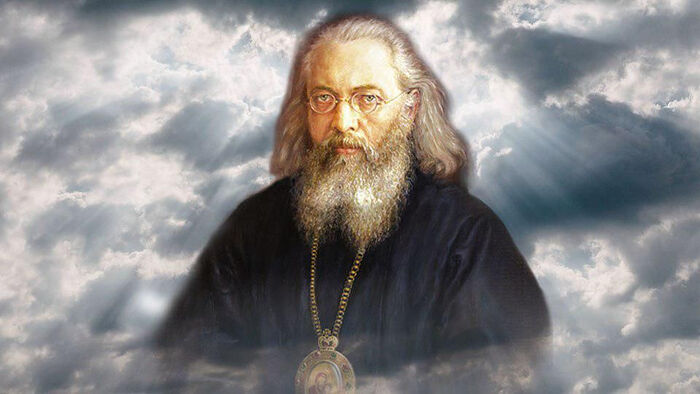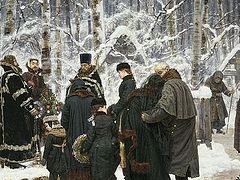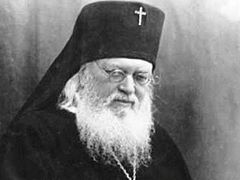For the Saturday day of the commemoration of the dead that comes before the feast of Pentecost, as well as the day of the St. Luke (Voino-Yasenetsky), we present the holy hierarch’s talk with parishioners on the commemoration of the dead.
To my great sorrow, some of you have started going to sectarian gatherings and have been infected with their false teachings.
Some have been infected with the false teaching that we shouldn’t pray for the dead, that we shouldn’t give alms for their repose. But you surely know that during Great Lent there is a service for the dead each Saturday. Therefore, you must confirm yourself in the Orthodox teaching on the commemoration of the dead; you must not believe what those people say who have broken off from the Church.
What does the Holy Church teach? We have ancient, very ancient proof that even the holy apostles commemorated the dead and prayed for them. In the works of the Teachers and Fathers of our Church that have come down to us, we have proof that already in deep antiquity, in the very first centuries of Christianity, prayers were made for the dead, and the dead were commemorated.
The first literature that we know of is what’s known as the Liturgy of St. James the Brother of the Lord. Just look at the prayer for the dead that is contained in this Liturgy: “O Lord, God of spirits and all flesh, remember the Orthodox whom we have named and those we have not named, from Righteous Abel to this day; Do Thou Thyself give them rest in the habitations of the living, in Thy Kingdom, in the delights of paradise, in the loins of Abraham, and Isaac, and Jacob our holy fathers, from whence sickness, sorrow, and sighing have fled, and where the light of Thy countenance visits them and hope illumines them.”
Do you see how much this ancient prayer resembles the one that you hear at every Liturgy: “God of spirits and all flesh…” We find the same words here. You can therefore see that the Church custom of commemorating the dead has its beginnings in apostolic times; that the Church has commemorated the dead throughout its history.
Tell me, who should we listen to—Church renegades and sectarians, or St. John Chrysostom? And now listen to what St. John says:
“It is not in vain that the apostles established the commemoration of the dead to be read before the Dread Mysteries. They knew that there is great benefit for the reposed from it, and it is a great benefaction. Offerings for the dead are not made in vain, neither are the prayers, or alms. All this was instituted by the Holy Spirit, Who desires that we receive benefit through each other.”
Remember, remember these words; believe that the commemoration of the dead was established by the apostles themselves, and even, as St. John Chrysostom says, by the Holy Spirit.
And it is not only in newer times, but also in the Old Testament were there prayers for the dead and offerings made for them. Here for example are the words of the Prophet Baruch: “O Lord Almighty, the God of Israel, hear now the prayer of the dead of Israel, and of their children, that have sinned before thee” (3:4). The prophet, as you can see, is talking about the prayers of the dead themselves—and this is extremely important for us, as you will see further in my talk. And if he asks for the prayers of the dead themselves to be heard, doesn’t that mean that we should support the power of their prayer with our own prayers from them?
In Holy Scripture there is a specific confirmation that sacrificial offerings for the dead were made hundreds of years before the Birth of Christ.
You do not know, unfortunately, the great history of the partisan wars that the Maccabee brothers began; the first of them, Judas, fought against the Antiochian king Epiphanius, who had made it his goal to wipe out the faith of the Jewish people and convert them all to paganism. This story is striking; striking is their valor, and God’s help in their work. The Lord as a rule preserved them all. One day several men fell in battle. Judas was very troubled. “How have you abandoned us?” But when they looked upon the corpses of the slain, they found things stolen from those against whom they had battled. Deeply sorrowed, all turned to prayer, asking that the sin which these fallen soldiers had committed be completely blotted out. And the valorous Judas, having taken a collection of 2000 silver drachmas, sent them to Jerusalem that they might be brought as a mercy sacrifice for their sin, and that they be forgiven that sin (cf. 12 Mac. 12:32–45). Isn’t this a clear testimony to the fact that in the Old Testament there were not only prayers but also offerings made for sinners who had died?
Upon what are the doubts based of those who listen to the sectarians, or to the Lutherans? They are based on, as the sectarians—Baptists, Evangelists—say, the supposition that there is no direct mention in Holy Scripture of prayers for the dead. But does that mean that these prayers are useless and even unpleasing to God?
Not at all, for the holy apostle James in his epistle commands us to prayer for each other (5:15). This does not mean that we should only prayer for those who are alive, who are near us; for you know that God is not the God of the dead, but the God of the living (Mk. 12:27). He Himself testifies to the fact that all are alive before God.
If a person dies, it does not mean that his soul ceases to exist; the body is destroyed, but the soul is immortal. It is alive, although it does not live with us; it lives a different life, just as saints live a different life—although the Lutherans and sectarians do not want to render them any honor or turn to them in prayer. Isn’t this disbelief in the immortality of the soul?
For if they believed that all are alive before God, that “God is not the God of the dead but the God of the living,” then they would not say that we shouldn’t commemorate the reposed; then they would understand that we must understand the commandment of the apostle James in the sense that we should pray also for those who are already living in another world.
Denial of the immortality of the soul is denial of Christianity itself, for Christ’s teaching is the teaching of eternal life. And could eternal life be possible if there is no immortality? Denying immortality means completely denigrating the straightforward and clear word of Jesus Christ spoken in His parable of the rich man and Lazarus, where we have a picture of the lot beyond the grave of the rich man and the poor man, Lazarus (Lk. 16:20–31).
Well so what then, if some, like the materialists, do not accept immortality; we must confirm ourselves in the thought that there is hope also for our brothers who have departed from us.
Often, every Saturday, you hear at the Liturgy the words of the holy apostle Paul: But I would not have you to be ignorant, brethren, concerning them which are asleep, that ye sorrow not, even as others which have no hope. For if we believe that Jesus died and rose again, even so them also which sleep in Jesus will God bring with him. For this we say unto you by the word of the Lord, that we which are alive and remain unto the coming of the Lord shall not prevent them which are asleep. For the Lord himself shall descend from heaven with a shout, with the voice of the archangel, and with the trump of God: and the dead in Christ shall rise first: Then we which are alive and remain shall be caught up together with them in the clouds, to meet the Lord in the air: and so shall we ever be with the Lord (1 Thess. 4:13–17).
“Reposed in Jesus” means that will God lead those who died with faith in Christ, with Christ to the place where He Himself is. Tell me, are there few sinners among us—or rather, aren’t the vast majority of people sinners, people who did not manage to cleanse their sinful deeds with tears of repentance? These make up the majority, and the apostle Paul says that we should not grieve, for God can bring them to Himself for the sake of their faith in Jesus Christ. And that in the future life, in the life beyond the grave before the Last Judgement, sins can be forgiven of those who did not manage to bring forth worthy fruits of repentance, don’t we find direct testimony in Christ’s words: All manner of sin and blasphemy shall be forgiven unto men: but the blasphemy against the Holy Ghost shall not be forgiven unto men. And whosoever speaketh a word against the Son of man, it shall be forgiven him: but whosoever speaketh against the Holy Ghost, it shall not be forgiven him, neither in this world, neither in the world to come (Matt. 12:31–32).
Blasphemy against the Holy Spirit is not forgiven in this life, nor in the future life. And if that be so, if in the future age beyond the grave forgiveness of lesser sins than blasphemy against the Holy Spirit is possible, that means that we should believe that the fate of our reposed loved ones, who may even have much uncleanness, many sins, can be made less onerous—for God is merciful, and God loves everyone. The same thought can be found in other words of the Lord Jesus Christ: Be not afraid of them that kill the body, and after that have no more that they can do. But I will forewarn you whom ye shall fear: Fear him, which after he hath killed hath power to cast into hell; yea, I say unto you, Fear him (Lk. 12:4–5).
Christ did not say that we need to fear him who after death can cast us into hell, but who “has the power to cast into hell”—who can cast either into hell or forgive.
Luther and the sectarians base their negative regard for the forgiveness of the dead on the words of Holy Scripture, which supposedly say that each person shall undoubtedly receive according to his deserts. For we must all appear before the judgment seat of Christ; that every one may receive the things done in his body, according to that he hath done, whether it be good or bad (Cor. 5:10). They say that this clearly shows that each will receive according to his deserts. Why pray when they get what they deserve anyway?
This passage is not at all about the judgment that will be pronounced at the Last Judgement. This is talking about the preliminary judgment that will be passed over everyone who has died after his death, and can be quite different from the Last Judgement.
The Lutherans and sectarians even say what the ancient heretics said, using their very words: “If it were true that prayer improves the lot of the dead, than everyone would be saved.” What evil words, as if they were displeased at the thought than all could be saved!”
But God is pleased at that thought. The Lord does not want anyone to perish. God wants that all be saved; and if it’s possible to improve the lot of our reposed loved ones through our offerings for them, wouldn’t this be something joyful for God, for us, and for God’s angels? Only the enemy of mankind does not want people to be saved; God wants all to be saved.
But it’s unpleasant for those who reject the need for prayer for the dead—as if they don’t want everyone to be saved. They base this on the words In hell Who will confess Thee? (Ps. 6:6).
They say that the Psalmist is specifically pointing out that one can’t confess from hell. Yes, Confession in the same sense as what we can do in life really is impossible—for what is true confession, which washes away our sins?
It is that verbal confession made before the priest, after which one is obligated to correct his path, to leave the path of sin, and not repeat the sin that one’s repented of. Such confession is not possible for the dead, because for them it’s all over—they can no longer change their lives because they are no longer alive.
Our unfortunate brothers who have died in sins and appeared before God at the preliminary judgment are tormented, sorrowful, and regret that they did not bring forth fruits worthy of repentance in this life. But they can of course send their sighs, sorrow, and regrets to God.
So, let’s help them with our prayers for them—because prayer for them is an expression of our love for them; and love is an omnipotent, invincible power. Love is from God; love never grows old; and every gift of love, every prayer of love for our reposed loved ones, and every love offering for them is pleasing to God, as are all expressions of love.
Thus, we must also prayer for our dead. Should we pray for all of them? No, not for all. The Holy Church shows that there are sinners for whom it is forbidden to pray, and we mustn’t do so. They are those who died hardened against God, against Christ; who died in unbelief, having committed serious sins. St. John the Theologian writes: If any man see his brother sin a sin which is not unto death, he shall ask, and he shall give him life for them that sin not unto death. There is a sin unto death: I do not say that he shall pray for it (1 Jn. 5:16).
Whoever has committed sins unto death, or sins that are not forgiven in this life or in the life to come—who blaspheme God, denied His existence, or trampled upon His law—his lot beyond the grave cannot be lightened.
There is yet another very effective means of lightening the lot of the dead. The Holy Church from very ancient times ascribes great significance to all deeds of mercy that are performed in memory of the reposed. And the Church ascribes the greatest significance to commemorating the dead during the Liturgy, when a particle of prosphora is taken out for the dead, and at the end of the Liturgy is placed into the chalice with the Blood of Christ; moreover the priest says, “Cleanse, O Lord, the sins of those commemorated here by Thy Precious Blood, through the prayers of the saints.”
Could the Blood of Christ be powerless? Couldn’t it cleanse the sins of those we commemorate?
Remember these very important means; remember that there is great significance in prayers for the repose of the souls of your loved ones; remember that you must do good deeds, deeds of mercy, deeds of love in their memory.
There are many such deeds before each of you—you yourselves see them and find them, and I will show you one deed by which you can ease the lot of your reposed ones. You heard the priest’s call to show Christian love to those unhappy children whom all have abandoned. You know how many orphans have been left from parents killed in war. You know that the government has orphanages and children’s homes for them, but there are so many orphans that they can’t build them fast enough, and you can see many of them on the streets and in the railway stations.
Those who have been taken into orphanages live in poverty, without maternal love and affection. Today I was touched when I heard about how some kind women got together and visited them. The little children ran to meet them shouting, “Mothers! Mothers have come!” That is what we need: that amongst you, women Christians, such mothers would be found.
We need good people to take upon themselves the care of those unfortunate children who have not yet been received into children’s homes, and perhaps even adopt them.




